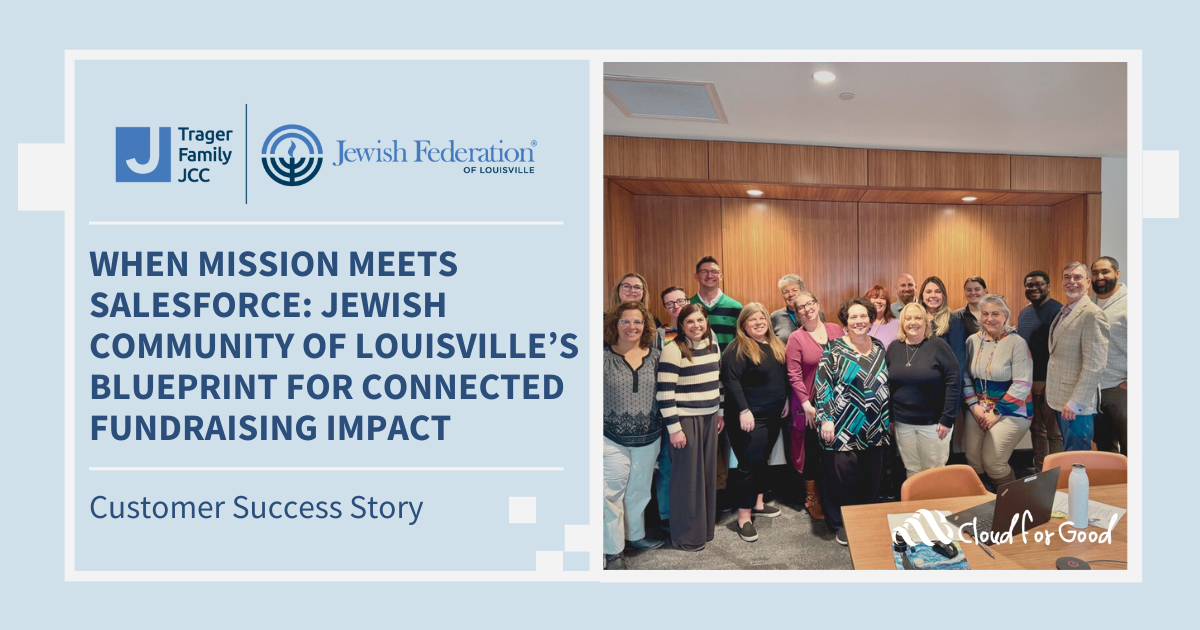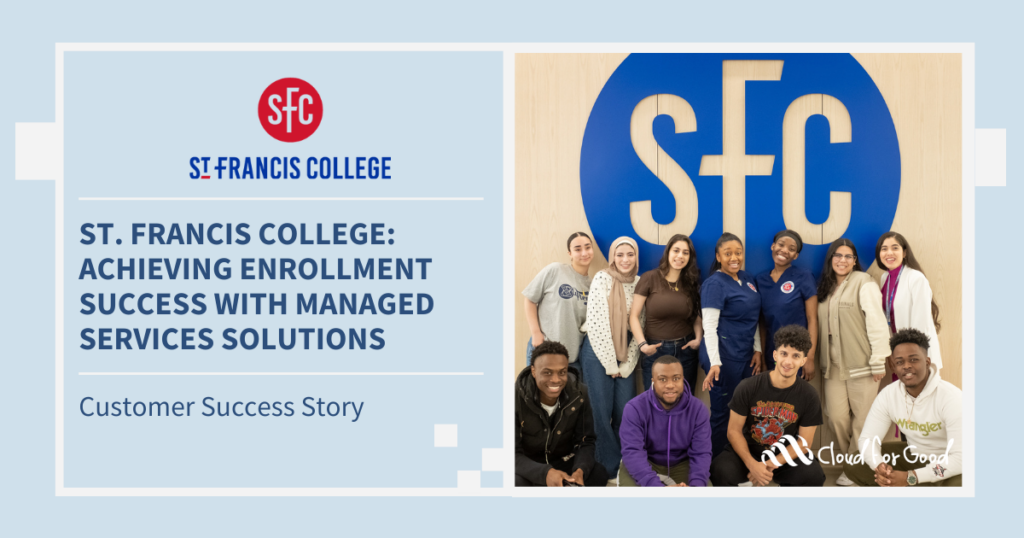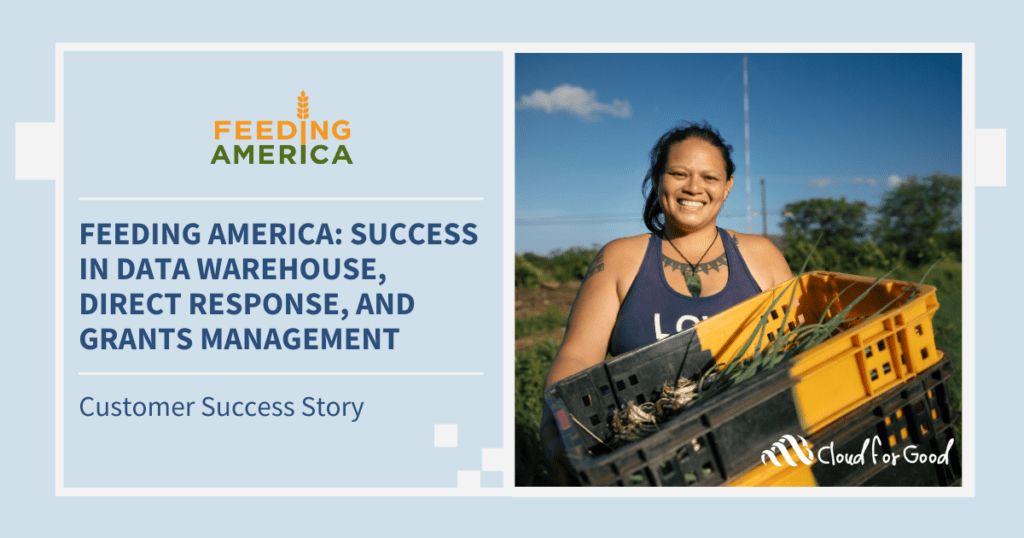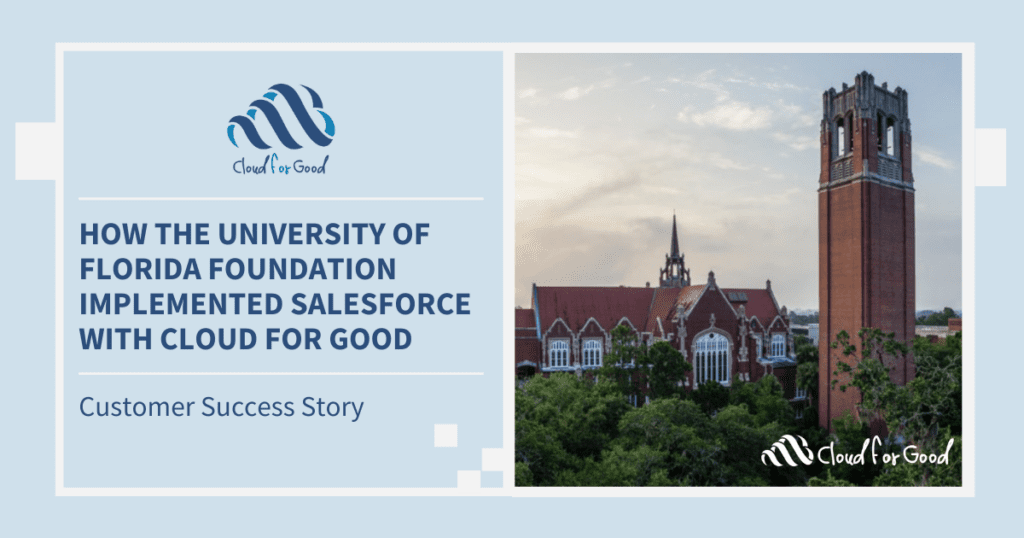Written by Gianna Weissensel
The Jewish Community of Louisville (JCL) is the merged entity of two agencies with more than 200 years of combined history in Louisville: the Jewish Community Center (Trager Family JCC), established in 1890, and the Jewish Federation of Louisville (Federation), established in 1934. Their mission is to be a community rooted in Jewish culture and values, providing a pathway to a changing world as we bring people together to discover, connect, and flourish.
The Trager Family JCC is the JCL’s arm for cultural, education, senior, early childhood, and social programs, as well as health and wellness activities; over 25,000 community members at large are served annually, including at-risk populations. Through an annual fundraising campaign, the Federation raises and distributes more than $2,000,000 each year to local Jewish agencies for cultural, educational, counseling, and scholarship assistance; provides programs and services for Jews and those in need locally; and partners with Jewish communities in Israel and around the world.
The Challenge: Bridging Complexity Across Legacy Systems

Behind the scenes, JCL was operating within a complex, multi-system environment. The Federation relied on siloed donor and financial systems, such as Abila Millennium, MIP, Fundriver, and Greater Giving – each heavily manual, working against the vision to scale and support the nuance of modern philanthropic operations. The Trager Family JCC, meanwhile, had been leveraging Salesforce via TractionRec to manage its membership and programmatic data, creating a partial, but isolated, view of the community.
The launch of a new Trager Family JCC facility in 2022 led to increased engagement, expanded programming, and higher donor expectations, underscoring the urgent need for a unified technology platform that supports real-time data access, cross-functional collaboration, and intelligent fundraising. JCL’s leadership saw the moment not just as a call for modernization, but as a strategic inflection point.
“We were not just replacing software,” said Frances Skolnick, Senior Director of Planned Giving and Endowment at JCL and the sponsor of the CRM initiative. “This was a comprehensive transformation—one that required us to rethink how we work, how we connect with our constituents, and how we build lasting philanthropic relationships. We needed a system that could reflect our complexity, not simplify it.”
The Vision: Connected Systems, Strategic Relationships
A clear and forward-thinking vision guided the CRM initiative: to unify the organization’s data, elevate its fundraising capabilities, and drive mission-aligned outcomes through connected systems. More than a technology upgrade, the project would enable JCL to:
- Identify and engage new donor segments across the Jewish and general communities
- Strengthen every constituent interaction through data-driven insights
- Break down barriers between the Federation and Trager Family JCC to enable seamless collaboration
- Raise more funds through diversified, strategic campaigns
- Become a catalyst for community transformation, both locally and globally
“We were looking for a solution that could support our vision—not just technically, but philosophically,” Skolnick noted. “We needed a platform that was flexible enough to evolve with us and a partner who could match our level of ambition.”
Finding the Right Partner
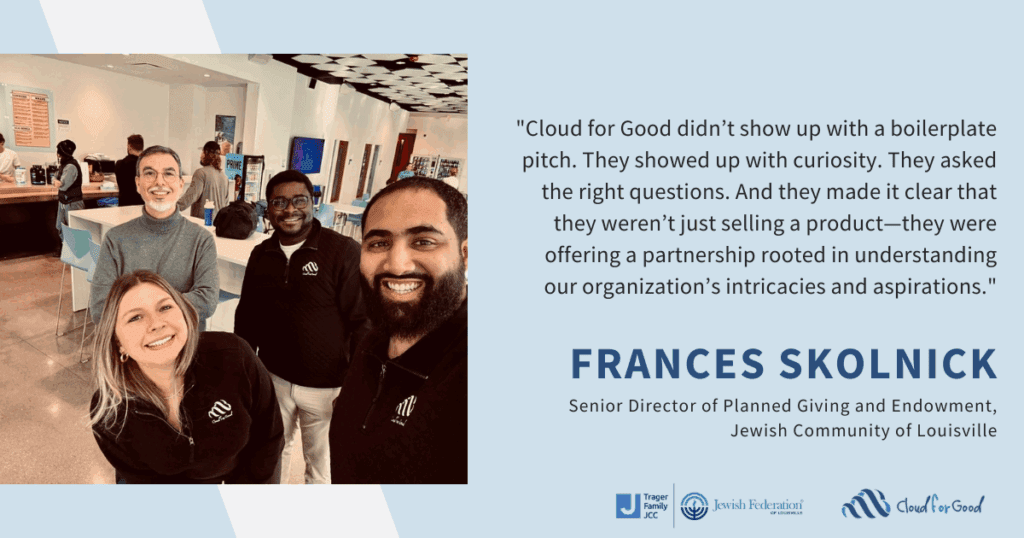
After a thorough evaluation process, Cloud for Good emerged as the clear choice for implementation.
“Cloud for Good didn’t show up with a boilerplate pitch,” Skolnick recalled. “They showed up with curiosity. They asked the right questions. And they made it clear that they weren’t just selling a product—they were offering a partnership rooted in understanding our organization’s intricacies and aspirations.”
When JCL requested a demo, Cloud for Good was the only firm that insisted on presenting it in person, bringing a multidisciplinary team that had already conducted in-depth research on the organization. “That in-person demo was a turning point,” Skolnick said. “They had already begun to think strategically about how to tailor Salesforce to meet our specific needs. That level of preparation, engagement, and humility set them apart.”
The Solution: A Unified Salesforce Ecosystem
Cloud for Good implemented a shared Salesforce org that integrated the Federation with the Trager Family JCC’s existing TractionRec system, enabling real-time data sharing across departments and functions.
Cross-Organizational Integration
To unify operations and eliminate data silos, JCL’s Salesforce solution was architected to seamlessly connect the Federation and Trager Family JCC within a single, shared ecosystem through:
- Shared Salesforce Instance: Trager Family JCC and the Federation now operate from a unified Salesforce environment, creating a 360-degree view of community members and donors.
- Seamless Data Flow: TractionRec integration ensures program, event, and philanthropic data live in one ecosystem—eliminating duplication and manual work.
Scalable Fundraising and Engagement
To support JCL’s evolving philanthropic strategy, the platform was built to scale donor engagement and fundraising efforts through intelligent tools and integrated workflows, including:
- Fundraising Package: Cloud for Good’s proprietary fundraising tools support tracking of giving histories, strategic outreach, and multi-channel campaign execution.
- GoFundMe Pro (Classy) Integration: Enables real-time donation processing and event management, fully embedded in Salesforce.
Data-Driven Collaboration
Engagement tools like Chatter, custom Engagement Plans, and Relationship Management features support cross-departmental collaboration—from Finance to Philanthropy to Marketing.
Marketing Empowerment
Salesforce Campaigns and Permission Sets allow the Marketing team to plan, execute, and measure events and communications independently.
Implementation with Intention
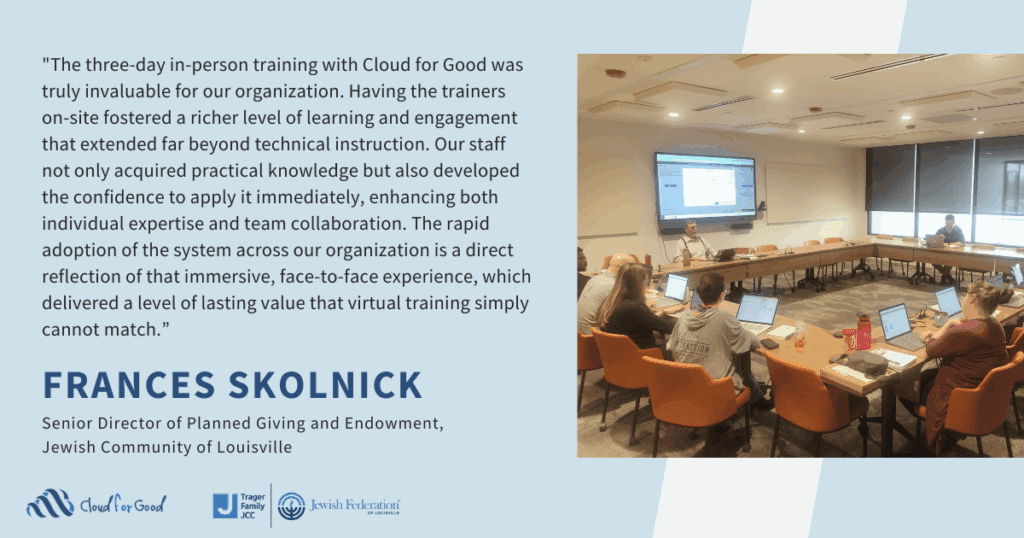
“This wasn’t just a lift-and-shift,” said Skolnick. “It was a reinvention of our internal processes, our external outreach, and our approach to stewardship.”
JCL prioritized intentional change management and training. In addition to pre-launch virtual sessions, Cloud for Good facilitated in-person training, followed by office hours and support from internal superusers.
“The three-day in-person training with Cloud for Good was truly invaluable for our organization. Having the trainers on-site fostered a richer level of learning and engagement that extended far beyond technical instruction. Our staff not only acquired practical knowledge but also developed the confidence to apply it immediately, enhancing both individual expertise and team collaboration. The rapid adoption of the system across our organization is a direct reflection of that immersive, face-to-face experience, which delivered a level of lasting value that virtual training simply cannot match,” Skolnick noted.
This training helped the team reach 100% adoption from philanthropy and finance department users, where Salesforce was being leveraged in their day-to-day work, within 2 weeks of launch.
“This kind of user adoption doesn’t happen by accident,” said Skolnick. “It was the product of preparation, strategic communication, and our commitment to making this transition meaningful for our team.”
Impact: A Foundation for Growth

JCL’s new CRM system was dubbed Maven, a Hebrew term meaning “expert” or “one who understands.” On day one, staff from both the Trager Family JCC and the Federation were working in a shared system for the first time.
“The impact was immediate,” said Skolnick. “We now have real-time access to reliable data. Our staff are more collaborative, more efficient, and more strategic. Salesforce isn’t just a tool, it’s become an extension of our culture.”
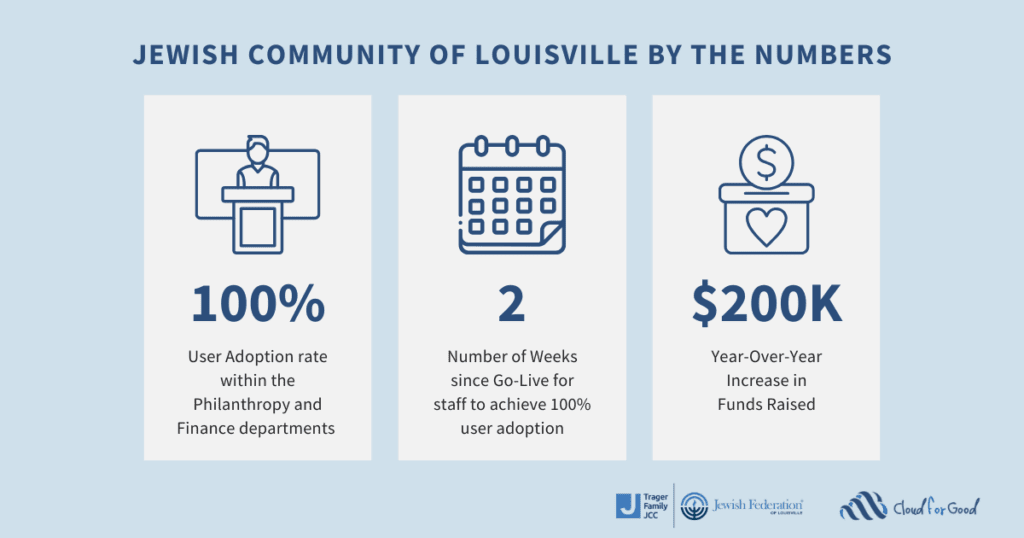
Prior to Salesforce, the Philanthropy team relied on a single staff member to pull donor data. Today, every team member has information at their fingertips, empowering them to use data in more meaningful ways. As they prepared for their upcoming telethon, the team was already seeing the benefits of the new system. They are now able to track pledges in real time and make agile, data-informed decisions during live donor outreach, contributing to a $200,000 year-over-year increase in funds raised.
Continuing the Impact
Recognizing that transformation doesn’t stop at go-live, JCL partnered with Cloud for Good’s Managed Services team to continue evolving their Salesforce org, which includes enhancing functionality, refining data processes, and expanding user capabilities.
“There’s still work to be done, but we expected that,” said Skolnick. “We’re now operating from a strong foundation—one that will allow us to grow smarter, fundraise more effectively, and stay deeply connected to our mission.”
To learn more about the Jewish Community of Louisville, visit www.jewishlouisville.org.
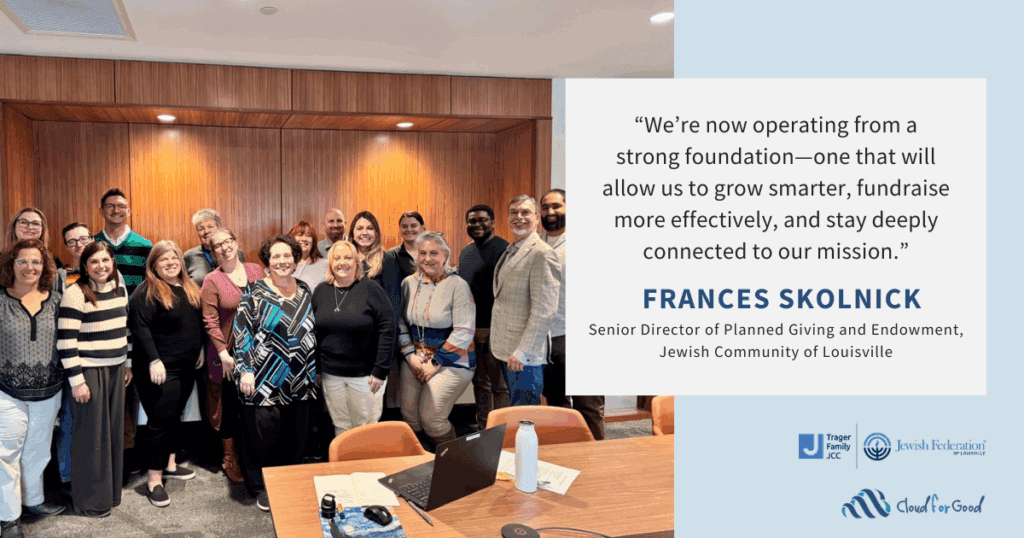
You Might Also Enjoy:
Success Story: How Crohn’s & Colitis Foundation is Creating a Unified Picture of its Fundraising with Salesforce
Success Story: Using Salesforce to Increase Engagement with Hillel International
- Change Management, CRM, customer success stories, customer success story, Data, Faith-Based Organizations, Fundraising, Implementation, implementation partner, Jewish Faith-Based Organizations, Managed Services, Marketing, nonprofit, real-time data, salesforce, success stories, success story, training, unified system, user adoption

